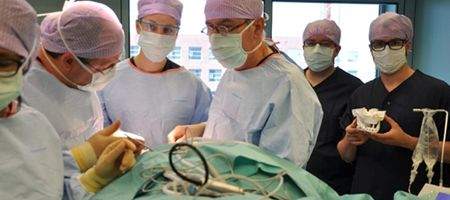An 83-year-old woman has become the first ever transplant recipient of a 3D printed jawbone.

The jawbone was made of thousands of layers of titanium powder and, say its creators, could pave the way for greater use of personalized, 3D-printed medical implants.
It was created by Belgian company LayerWise, in conjunction with doctors and academics, to a patient-specific design that incorporates articulated joints, and was then given a bioceramic coating.
“The new treatment method is a world premiere because it concerns the first patient‐specific implant in replacement of the entire lower jaw. The implant integrates multiple functions, including dimples increasing the surface area, cavities promoting muscle attachment, and sleeves to lead mandible nerves,” says professo Dr Jules Poukens of the University Hasselt, who carried out the operation.
“Furthermore, the mandible implant is equipped to directly insert dental bar and/or bridge implant suprastructures at a later stage.”
The woman had been suffering from progressive osteomyelitis, which affected almost the entire lower jaw bone. The implantation – which took just four hours, a fraction of the time usually required for reconstructive surgery – was entirely successful, says the team.
The woman was able to speak within hours, and returned home after just four days.
“Besides a successful track record in industrial sectors, metal AM [Additive manufacturing] is gaining importance in medical implantology. AM’s freedom of shape allows the most complex freeform geometries to be produced as a single part prior to surgery,” says Peter Mercelis, managing director of LayerWise.
“As illustrated by the lower jaw reconstruction, patient-specific implants can potentially be applied on a much wider scale than transplantation of human bone structures and soft tissues.”
He says that such implants yield excellent form and function, speed up surgery and patient recovery, and reduce the risk of medical complications.






